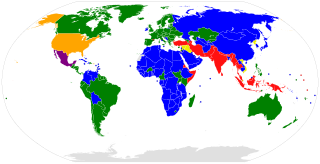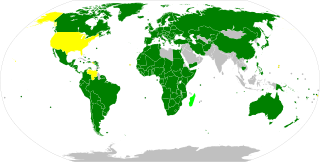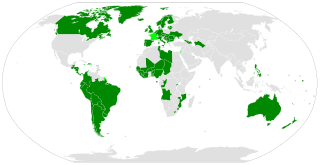Nationality is the legal status of belonging to a particular nation, defined as a group of people organized in one country, under one legal jurisdiction, or as a group of people who are united on the basis of culture.

The special administrative regions (SAR) of the People's Republic of China are one of four types of province-level divisions of the People's Republic of China directly under the control of its Central People's Government, being integral areas of the country. As a region, they possess the highest degree of autonomy from China's central government. However, despite the relative autonomy that the Central People's Government offers the special administrative regions, the National People's Congress and its Standing Committee remains capable of enforcing laws for the special administrative regions.

Jus soli, meaning 'right of soil', is the right of anyone born in the territory of a state to nationality or citizenship. Also commonly referred to as birthright citizenship in some Anglophone countries, it is a rule defining a person's nationality based on their birth in the territory of the country. Jus soli was part of the English common law, in contrast to jus sanguinis, which derives from the Roman law that influenced the civil-law systems of mainland Europe.

The Convention relative to the Protection of Civilian Persons in Time of War, more commonly referred to as the Fourth Geneva Convention and abbreviated as GCIV, is one of the four treaties of the Geneva Conventions. It was adopted in August 1949, and came into force in October 1950. While the first three conventions dealt with combatants, the Fourth Geneva Convention was the first to deal with humanitarian protections for civilians in a war zone. There are currently 196 countries party to the 1949 Geneva Conventions, including this and the other three treaties.

The International Covenant on Civil and Political Rights (ICCPR) is a multilateral treaty that commits nations to respect the civil and political rights of individuals, including the right to life, freedom of religion, freedom of speech, freedom of assembly, electoral rights and rights to due process and a fair trial. It was adopted by United Nations General Assembly Resolution 2200A (XXI) on 16 December 1966 and entered into force on 23 March 1976 after its thirty-fifth ratification or accession. As of June 2024, the Covenant has 174 parties and six more signatories without ratification, most notably the People's Republic of China and Cuba; North Korea is the only state that has tried to withdraw.

The Outer Space Treaty, formally the Treaty on Principles Governing the Activities of States in the Exploration and Use of Outer Space, including the Moon and Other Celestial Bodies, is a multilateral treaty that forms the basis of international space law. Negotiated and drafted under the auspices of the United Nations, it was opened for signature in the United States, the United Kingdom, and the Soviet Union on 27 January 1967, entering into force on 10 October 1967. As of March 2024, 115 countries are parties to the treaty—including all major spacefaring nations—and another 22 are signatories.
In international law, a stateless person is someone who is "not considered as a national by any state under the operation of its law". Some stateless people are also refugees. However, not all refugees are stateless, and many people who are stateless have never crossed an international border. At the end of 2022, the United Nations High Commissioner for Refugees estimated 4.4 million people worldwide as either stateless or of undetermined nationality, 90,800 (+2%) more than at the end of 2021.
Refugee law is the branch of international law which deals with the rights and duties states have vis-a-vis refugees. There are differences of opinion among international law scholars as to the relationship between refugee law and international human rights law or humanitarian law.

A certificate of identity, sometimes called an alien's passport, is a travel document issued by a country to non-citizens residing within their borders who are stateless persons or otherwise unable to obtain a passport from their state of nationality. Some states also issue certificates of identity to their own citizens as a form of emergency passport or otherwise in lieu of a passport. The visa requirements of certificates of identity may be different from those of regular passports.

The Convention Relating to the Status of Refugees, also known as the 1951 Refugee Convention or the Geneva Convention of 28 July 1951 is a United Nations multilateral treaty that defines who a refugee is and sets out the rights of individuals who are granted asylum and the responsibilities of nations that grant asylum. The convention also sets out which people do not qualify as refugees, such as war criminals. The convention also provides for some visa-free travel for holders of refugee travel documents issued under the convention.
Nationality law is the law of a sovereign state, and of each of its jurisdictions, that defines the legal manner in which a national identity is acquired and how it may be lost. In international law, the legal means to acquire nationality and formal membership in a nation are separated from the relationship between a national and the nation, known as citizenship. Some nations domestically use the terms interchangeably, though by the 20th century, nationality had commonly come to mean the status of belonging to a particular nation with no regard to the type of governance which established a relationship between the nation and its people. In law, nationality describes the relationship of a national to the state under international law and citizenship describes the relationship of a citizen within the state under domestic statutes. Different regulatory agencies monitor legal compliance for nationality and citizenship. A person in a country of which he or she is not a national is generally regarded by that country as a foreigner or alien. A person who has no recognised nationality to any jurisdiction is regarded as stateless.

British nationality law as it pertains to Hong Kong has changed over time since it became a British colony in 1842. Hongkongers were given various nationality statuses, such as British subjects, Citizen of the United Kingdom and Colonies, British Dependent Territories Citizen and British Nationals (Overseas).

The Vienna Convention on Consular Relations is an international treaty that defines a framework for consular relations between sovereign states. It codifies many consular practices that originated from state custom and various bilateral agreements between states.

The United Nations Convention on Contracts for the International Sale of Goods (CISG), sometimes known as the Vienna Convention, is a multilateral treaty that establishes a uniform framework for international commerce. As of December 2023, it has been ratified by 97 countries, representing two-thirds of world trade.

Nationality law of Greece is based on the principle of jus sanguinis. Greek citizenship may be acquired by descent or through naturalization. Greek law permits dual citizenship. A Greek national is a citizen of the European Union, and therefore entitled to the same rights as other EU citizens.

The Convention on the Reduction of Statelessness is a 1961 United Nations multilateral treaty whereby sovereign states agree to reduce the incidence of statelessness. The Convention was originally intended as a Protocol to the Convention Relating to the Status of Refugees, while the 1954 Convention Relating to the Status of Stateless Persons was adopted to cover stateless persons who are not refugees and therefore not within the scope of the Convention Relating to the Status of Refugees.

The Convention on the Nationality of Married Women is an international convention passed by the United Nations General Assembly in 1957. It entered into force in 1958 and as of 2024 it has 75 state parties.
Guy Serle Goodwin-Gill is a barrister and a professor of public international law at Oxford University and a Fellow of All Souls College, Oxford.
The Nuclear Terrorism Convention is a 2005 United Nations treaty designed to criminalize acts of nuclear terrorism and to promote police and judicial cooperation to prevent, investigate and punish those acts. As of January 2024, the convention has 115 signatories and 124 state parties, including the nuclear powers China, France, India, Russia, the United Kingdom, and the United States. Most recently, Palau ratified the convention on January 19, 2024.

Somaliland a self-declared independent country in the Horn of Africa in which inhabitants were initially governed by various kinship networks. Upon contact with Europeans, treaties were signed in the area to secure rights to trade in the territory in exchange for protection of clans from rivals. Britain formally extended a protectorate over British Somaliland in 1898. Inhabitants of Somaliland were British Protected Persons from that date until they gained their independence in 1960 and joined in the union of their state with Italian Somaliland to form the Somali Republic. Inhabitants derive their nationality from Somali law. The legal means to acquire nationality, formal legal membership in a sovereign nation, differ from the domestic relationship of rights and obligations between a citizen within its nation, known as citizenship. Nationality describes the relationship of an individual to the nation under international law, whereas citizenship is the domestic relationship of an individual within the state. As the African Union, United Nations, and no independent nation has recognized its national sovereignty, Somaliland's inhabitants are Somali nationals, but since declaring its independence in 1991, it has de facto authority to control internal affairs and citizenship within its territory.














